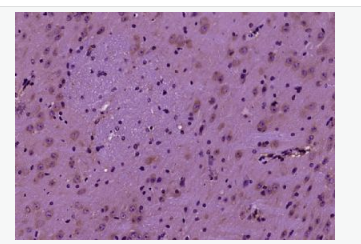| 中文名稱 | RNA結(jié)合蛋白LIN28抗體 |
| 別 名 | Lin 28; Lin28A; Lin 28 homolog (C. elegans); Lin 28 homolog A; Lin 28 homolog; Lin-28;y Lin-28 homolog (C. elegans); Lin-28 homolog A; Lin-28A; Lin28; Lin28a; LN28A_HUMAN; Protein lin-28 homolog A; RNA binding protein lin 28; RNA binding protein lin-28; Tex17; ZCCHC1; Zinc finger CCHC domain containing 1; Zinc finger CCHC domain containing protein 1; Zinc finger CCHC domain-containing protein 1; AL024421; CSDD1. |
| 研究領(lǐng)域 | 細(xì)胞生物 免疫學(xué) 發(fā)育生物學(xué) 神經(jīng)生物學(xué) 干細(xì)胞 表觀遺傳學(xué) |
| 抗體來源 | Rabbit |
| 克隆類型 | Polyclonal |
| 交叉反應(yīng) | Human, Mouse, Rat, (predicted: Pig, Cow, Horse, Rabbit, Sheep, ) |
| 產(chǎn)品應(yīng)用 | WB=1:500-2000 ELISA=1:500-1000 IHC-P=1:100-500 IHC-F=1:100-500 IF=1:50-200 (石蠟切片需做抗原修復(fù)) not yet tested in other applications. optimal dilutions/concentrations should be determined by the end user. |
| 分 子 量 | 29kDa |
| 細(xì)胞定位 | 細(xì)胞核 細(xì)胞漿 |
| 性 狀 | Liquid |
| 濃 度 | 1mg/ml |
| 免 疫 原 | KLH conjugated synthetic peptide derived from human Lin28:75-180/209 |
| 亞 型 | IgG |
| 純化方法 | affinity purified by Protein A |
| 儲 存 液 | 0.01M TBS(pH7.4) with 1% BSA, 0.03% Proclin300 and 50% Glycerol. |
| 保存條件 | Shipped at 4℃. Store at -20 °C for one year. Avoid repeated freeze/thaw cycles. |
| PubMed | PubMed |
| 產(chǎn)品介紹 | LIN-28 is a highly conserved, RNA-binding, cytoplasmic protein. It consists of a cold shock domain and retroviral-type (CCHC) zinc finger motifs that were first identified in Caenorhabditis elegans. LIN-28 controls the timing of events during embryonic development and is readily expressed in embryos, embryonic stem cells and embryonal carcinoma cells. The presence of LIN-28 persists in some adult tissues including cardiac and skeletal muscle. In differentiating myoblasts, LIN-28 increases protein synthesis efficiency and binds to the growth and differentiation factor IGF-II. Function: Acts as a 'translational enhancer', driving specific mRNAs to polysomes and thus increasing the efficiency of protein synthesis. Its association with the translational machinery and target mRNAs results in an increased number of initiation events per molecule of mRNA and, indirectly, in stabilizing the mRNAs. Binds IGF2 mRNA, MYOD1 mRNA, ARBP/36B4 ribosomal protein mRNA and its own mRNA. Essential for skeletal muscle differentiation program through the translational up-regulation of IGF2 expression (By similarity). Acts as a suppressor of microRNA (miRNA) biogenesis by specifically binding the precursor let-7 (pre-let-7), a miRNA precursor. Acts by binding pre-let-7 and recruiting ZCCHC11/TUT4 uridylyltransferase, leading to the terminal uridylation of pre-let-7. Uridylated pre-let-7 miRNAs fail to be processed by Dicer and undergo degradation. Degradation of pre-let-7 in embryonic stem (ES) cells contributes to the maintenance of ES cells. In contrast, LIN28A down-regulation in neural stem cells by miR-125, allows the processing of pre-let-7. Specifically recognizes the 5'-GGAG-3' motif in the terminal loop of pre-let-7. Also recognizes and binds non pre-let-7 pre-miRNAs that contain the 5'-GGAG-3' motif in the terminal loop, leading to their terminal uridylation and subsequent degradation. Subunit: Monomer. During skeletal muscle differentiation, associated with translation initiation complexes in the polysomal compartment. Directly interacts with EIF3S2. Interaction with NCL is RNA-dependent (By similarity). Interacts with ZCCHC11/TUT4. Subcellular Location: Cytoplasm. Nucleus > nucleolus. Nucleolar localization observed in 10-15% of the nuclei in differentiated myotubes (By similarity). Shuttles between the cytoplasm and the nucleus. Localizes to cytoplasmic processing bodies and stress granules. Tissue Specificity: Expressed in embryonic stem cells (ES cells), placenta and testis. Similarity: Belongs to the lin-28 family. Contains 2 CCHC-type zinc fingers. Contains 1 CSD (cold-shock) domain. SWISS: Q9H9Z2 Gene ID: 79727 Database links: Entrez Gene: 79727 Human Entrez Gene: 83557 Mouse Entrez Gene: 500562 Rat Omim: 611043 Human SwissProt: Q9H9Z2 Human SwissProt: Q8K3Y3 Mouse Unigene: 86154 Human Unigene: 302567 Mouse Unigene: 147538 Rat Important Note: This product as supplied is intended for research use only, not for use in human, therapeutic or diagnostic applications. |
| 產(chǎn)品圖片 | 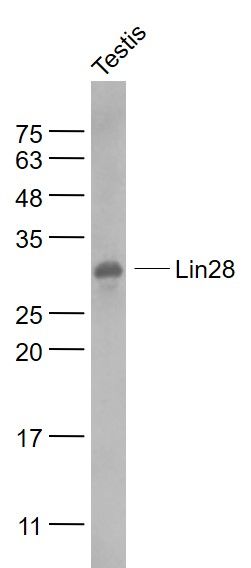 Sample: Sample:Testis (Mouse) Lysate at 40 ug Primary: Anti- Lin28 (bs-8443R) at 1/1000 dilution Secondary: IRDye800CW Goat Anti-Rabbit IgG at 1/20000 dilution Predicted band size: 29 kD Observed band size: 29 kD 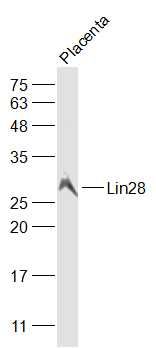 Sample: Sample:Placenta (Mouse) Lysate at 40 ug Primary: Anti-Lin28 (bs-8443R) at 1/1000 dilution Secondary: IRDye800CW Goat Anti-Rabbit IgG at 1/20000 dilution Predicted band size: 29 kD Observed band size: 29 kD 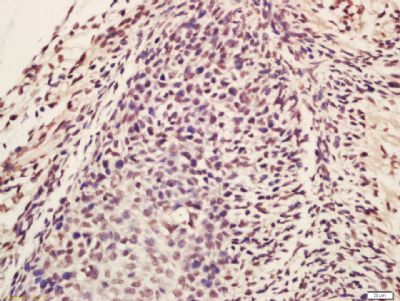 Tissue/cell: mouse embryo tissue; 4% Paraformaldehyde-fixed and paraffin-embedded; Tissue/cell: mouse embryo tissue; 4% Paraformaldehyde-fixed and paraffin-embedded;Antigen retrieval: citrate buffer ( 0.01M, pH 6.0 ), Boiling bathing for 15min; Block endogenous peroxidase by 3% Hydrogen peroxide for 30min; Blocking buffer (normal goat serum,C-0005) at 37℃ for 20 min; Incubation: Anti-Lin28 Polyclonal Antibody, Unconjugated(bs-8443R) 1:200, overnight at 4°C, followed by conjugation to the secondary antibody(SP-0023) and DAB(C-0010) staining 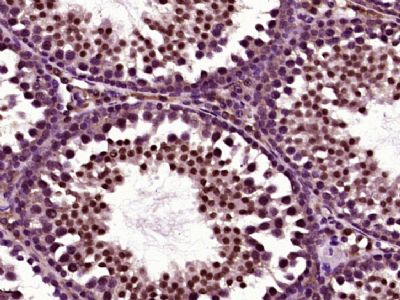 Paraformaldehyde-fixed, paraffin embedded (Rat testis); Antigen retrieval by boiling in sodium citrate buffer (pH6.0) for 15min; Block endogenous peroxidase by 3% hydrogen peroxide for 20 minutes; Blocking buffer (normal goat serum) at 37°C for 30min; Antibody incubation with (Lin28) Polyclonal Antibody, Unconjugated (bs-8443R) at 1:400 overnight at 4°C, followed by operating according to SP Kit(Rabbit) (sp-0023) instructions and DAB staining. Paraformaldehyde-fixed, paraffin embedded (Rat testis); Antigen retrieval by boiling in sodium citrate buffer (pH6.0) for 15min; Block endogenous peroxidase by 3% hydrogen peroxide for 20 minutes; Blocking buffer (normal goat serum) at 37°C for 30min; Antibody incubation with (Lin28) Polyclonal Antibody, Unconjugated (bs-8443R) at 1:400 overnight at 4°C, followed by operating according to SP Kit(Rabbit) (sp-0023) instructions and DAB staining. |
我要詢價
*聯(lián)系方式:
(可以是QQ、MSN、電子郵箱、電話等,您的聯(lián)系方式不會被公開)
*內(nèi)容:


